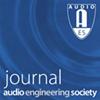钢琴:一个由乐器知识提供信息的神经声音合成器
IF 1.6
4区 工程技术
Q3 ACOUSTICS
引用次数: 2
摘要
本文章由计算机程序翻译,如有差异,请以英文原文为准。
DDSP-Piano: A Neural Sound Synthesizer Informed by Instrument Knowledge
Instrument sound synthesis using deep neural networks has received numerous improvements over the last couple of years. Among them, the Differentiable Digital Signal Processing (DDSP) framework has modernized the spectral modeling paradigm by including signal-based synthesizers and effects into fully differentiable architectures. The present work extends the applications of DDSP to the task of polyphonic sound synthesis, with the proposal of a differentiable piano synthesizer conditioned on MIDI inputs. The model architecture is motivated by high-level acoustic modeling knowledge of the instrument, which, along with the sound structure priors inherent to the DDSP components, makes for a lightweight, interpretable, and realistic-sounding piano model. A subjective listening test has revealed that the proposed approach achieves better sound quality than a state-of-the-art neural-based piano synthesizer, but physical-modeling-based models still hold the best quality. Leveraging its interpretability and modularity, a qualitative analysis of the model behavior was also conducted: it highlights where additional modeling knowledge and optimization procedures could be inserted in order to improve the synthesis quality and the manipulation of sound properties. Eventually, the proposed differentiable synthesizer can be further used with other deep learning models for alternative musical tasks handling polyphonic audio and symbolic data.
求助全文
通过发布文献求助,成功后即可免费获取论文全文。
去求助
来源期刊

Journal of the Audio Engineering Society
工程技术-工程:综合
CiteScore
3.50
自引率
14.30%
发文量
53
审稿时长
1 months
期刊介绍:
The Journal of the Audio Engineering Society — the official publication of the AES — is the only peer-reviewed journal devoted exclusively to audio technology. Published 10 times each year, it is available to all AES members and subscribers.
The Journal contains state-of-the-art technical papers and engineering reports; feature articles covering timely topics; pre and post reports of AES conventions and other society activities; news from AES sections around the world; Standards and Education Committee work; membership news, patents, new products, and newsworthy developments in the field of audio.
 求助内容:
求助内容: 应助结果提醒方式:
应助结果提醒方式:


